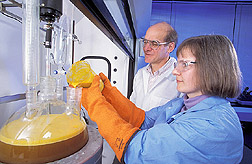This page has been archived and is being provided for reference purposes only. The page is no longer being updated, and therefore, links on the page may be invalid.
|
|
USDA Agency Hosts Biobased Products Conference
By Jan SuszkiwFebruary 28, 2005
WASHINGTON, February 28—The Agricultural Research Service (ARS) is hosting a two-day conference here to foster United States-European collaborative research that will develop biobased products and fuels from plants. ARS is the U.S. Department of Agriculture's chief in-house scientific research agency.
Forty to 50 scientific representatives from government, industry and academia are participating in the conference at the George Washington Carver Center in Beltsville, Md. The conference will include presentations and group discussions on collaborative research among U.S. and European scientists, especially those in the fields of molecular biology and plant genomics.
"Biobased products are fuels, industrial oils, lubricants, plastics and other materials that are made from plant or animal resources rather than petrochemicals," noted Judy St. John, an ARS deputy administrator and member of the U.S.-European Commission (EC) Task Force on Biotechnology Research, which is sponsoring the conference March 1-2.
Biobased products have the potential to create new market opportunities for farmers while easing society's reliance on petroleum.
"Plants, however, offer some challenges that must be overcome in order to improve their usefulness as a sustainable alternative to petroleum feedstocks," said St. John. "These challenges are of such a scope that it is unlikely that one laboratory, or even one country's scientific community, will easily overcome them alone."
St. John will be joined as a discussion leader at the conference by Christian Patermann and Laurent Bochereau, Director and Head of Unit, respectively, for EC's Biotechnology, Agriculture and Food Research.
Other speakers include scientists currently engaged in biobased research, members of academia, and industry representatives from both the United States and Europe. Diana Bowles of the University of York, United Kingdom, and Sarah Hake of ARS' Plant Gene Expression Center, Albany, Calif., are among the first speakers. On March 1, they will discuss the importance of examining the composition and organization of plant cell walls. That area of research is deemed critical to an approach called "biorefining," which seeks to tap solar energy produced in plants by photosynthesis.
According to St. John, the plant cell wall research is one of two flagship projects that the U.S.-EC task force has chosen as a model for cooperation. The other flagship project involves research to better exploit oilseed crops as sources of long-chain hydrocarbons, which can be used as petroleum-like feedstocks to make industrial oils and other biobased products.
Breakout sessions are also being held so that conference members can discuss the potential hurdles and outcomes to achieving these flagship projects, as well as to identify other flagship projects on which U.S. and European scientists can collaborate.
"Ultimately," St. John said, "the objective is to improve the economic viability of biobased products for consumers, to offer economic benefits to growers and rural communities, to reduce our dependence on petroleum and to safeguard the environment."

